Publish Date: Jun 3, 2024 | Keywords: Communication, Contemporary EHF 2024, Occupational health, Publications, Safety
| Document
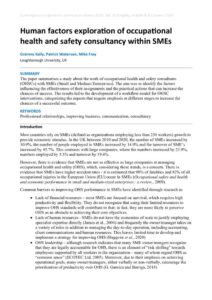
|
Author
Grainne Kelly, Patrick Waterson, Mike Fray |
Abstract
The paper summarises a study about the work of occupational health and safety consultants (OHSCs) with SMEs (Small and Medium Enterprises). The aim was to identify the factors influencing the effectiveness of their assignments and the practical actions that can increase the chances of success. The results led to the development of a workflow model for OHSC interventions, categorizing the aspects that require emphasis at different stages to increase the chances of a successful outcome. |
Publish Date: Jun 3, 2024 | Keywords: Aviation, Contemporary EHF 2024, Human factors integration, Incidents, Publications, Safety, Safety culture
| Document
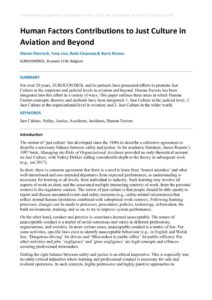
|
Author
Steven Shorrock, Tony Licu, Radu Cioponea & Barry Kirwan |
Abstract
For over 20 years, EUROCONTROL and its partners have pioneered efforts to promote Just Culture at the corporate and judicial levels in aviation and beyond. Human Factors has been integrated into this effort in a variety of ways. This paper outlines three areas in which Human Factors concepts, theories and methods have been integrated: 1. Just Culture at the judicial level; 2. Just Culture at the organisational level in aviation; and 3. Just Culture in the wider world. |
Publish Date: Jun 3, 2024 | Keywords: Contemporary EHF 2024, Defence, Design, Organisational design, Publications
| Document
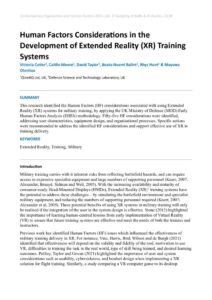
|
Author
Victoria Cutler, Caitlin Moore, David Taylo, Beata-Noemi Balint, Rhys Hunt & Mayowa Olonilua |
Abstract
This research identified the Human Factors (HF) considerations associated with using Extended Reality (XR) systems for military training, by applying the UK Ministry of Defence (MOD) Early Human Factors Analysis (EHFA) methodology. Fifty-five HF considerations were identified, addressing user characteristics, equipment design, and organisational processes. Specific actions were recommended to address the identified HF considerations and support effective use of XR in training delivery. |
Publish Date: Jun 3, 2024 | Keywords: Contemporary EHF 2024, Energy, Human factors integration, Publications
| Document
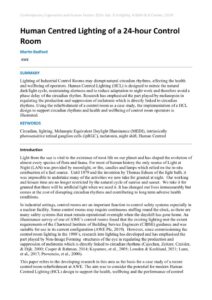
|
Author
Martin Redford |
Abstract
Lighting of Industrial Control Rooms may disrupt natural circadian rhythms, affecting the health and wellbeing of operators. Human Centred Lighting (HCL) is designed to mimic the natural dark/light cycle, maintaining alertness and to reduce adaptation to night work and therefore avoid a phase delay of the circadian rhythm. Research has emphasised the part played by melanopsin in regulating the production and suppression of melatonin which is directly linked to circadian rhythms. Using the refurbishment of a control room as a case study, the implementation of a HCL design to support circadian rhythms and health and wellbeing of control room operators is illustrated. |
Publish Date: May 31, 2024 | Keywords: Contemporary EHF 2024, Data, Health & Safety, Publications, Safety
| Document
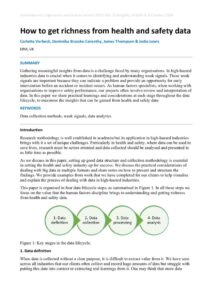
|
Author
Carlotta Vorbeck, Dominika Brzoska-Corenthy, James Thompson & Jodie Lewis |
Abstract
Gathering meaningful insights from data is a challenge faced by many organisations. In high-hazard industries data is crucial when it comes to identifying and understanding weak signals. These weak signals are important because they can indicate a problem and provide an opportunity for early intervention before an accident or incident occurs. As human factors specialists, when working with organisations to improve safety performance, our projects often involve review and interpretation of data. In this paper we share practical learnings and considerations at each stage throughout the data lifecycle, to maximise the insights that can be gained from health and safety data. |





